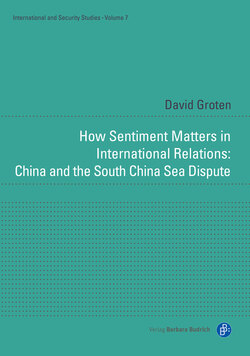Читать книгу How Sentiment Matters in International Relations: China and the South China Sea Dispute - David Groten - Страница 21
На сайте Литреса книга снята с продажи.
2.2.2 Hypothesis II: ‘Chinese50 disrespect experiences in the context of the SCS dispute are severe and have been increasing over time’51
ОглавлениеThe degree to which respect expectations are met is said to depend on an “actor’s interpretation of its partner’s behavior” (Wolf, 2011, p. 11). Therefore, Hypothesis II concerns the identification of discursive manifestations of respect and disrespect experiences in Chinese discourses on U.S. and Philippine conduct pertaining to the South China Sea. As respect dynamics, particularly experiences of disrespect, are usually not apparent at first sight, a set of six indicators is utilized for the sake of respect tracing (see chapter 2.3.1). Accordingly, if the majority of these indicators can be confirmed for a given sub-case, respect dynamics and disrespect experiences are considered present. Moreover, in the event that respect dynamics are found significant, Hypothesis II seeks to determine and critically reflect on prevailing patterns of respect expectations52. In this vein, it is anticipated that a shift in (self-perceived) status (Hypothesis I) and the resulting increase in relative status differences have facilitated a blunt articulation of respect expectations following a growing sense of entitlement53. That said, a growing mismatch between China’s self-attributed status and the adequacy of external conduct is estimated to cause mounting disrespect experiences. Furthermore, it is discussed as to whether [46] respect expectations positively correlate to the status of the opposing country. In other words: is China more eager (sensitive) to obtain respect by a high-status than by a low-status actor? The following questions are guiding the discussion on Hypothesis II:
- Which of the respect indicators can be identified and to what extent do they prove significant?
- What kind of alleged offenses has been subject to discussion over time?
- Have disrespect experiences aroused substantial negative emotions like anger and injustice?54
- Does the severity of disrespect experiences vary by the status of the offender?
- Did Chinese respect-related expectations toward the conduct and attitude of other stakeholders rise over time, hence matching shifting levels of self-perceived status and identity conceptions?55
In sum, the scope of Hypothesis II is restricted to the input dimension56 of respect and disrespect experiences and related sentiments of anger, injustice and frustration.
